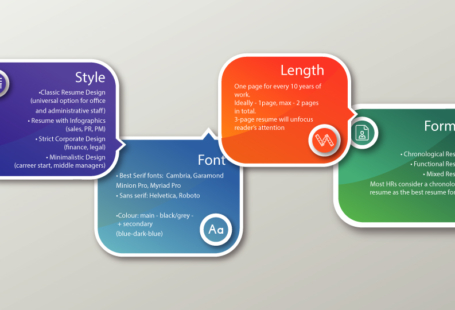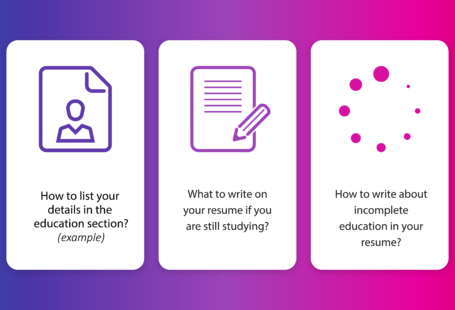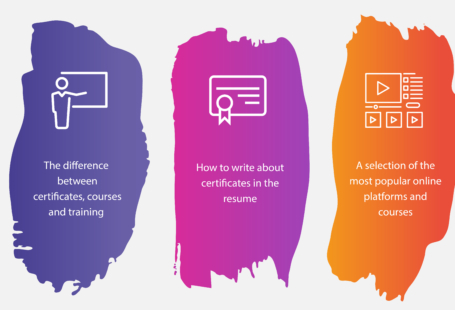Usually, you will not find a cover letter attached to an applicant’s resume. There are a couple of reasons for this; job applicants often consider this a formality, or a waste of energy. Others simply may not know how to write a cover letter! But you don’t get a second chance to make a first impression. In this article, you will learn:
- How to become the main contender for the desired vacancy
- How to win competitors which have more advantages
- What a cover letter looks like, what to include in it, and how to write a great one
Experiment: How we shamelessly used recruiters for science and our readers
We began our preparations for this article with a little experiment: our idea was to see how employers respond to a cover letter attached to a job application. Does it really increase the applicant’s chances of success?
We collected 90 vacancies, featuring essentially the same descriptor: an elite real estate sales manager with approximately the same salary plug. All cities were used as filters, taking into account proposals both in-state and for remote applicants.
Next, we sent resumes to HR managers in the first group without a cover letter, and to the second and third groups, we dispatched resumes + letters with different contents.
Group No. 2 received a resume with an emotional summary letter:
“Good day! I am very interested in the vacancy of a sales manager in your company! I believe that my previous work experience perfectly matches your requirements, and I have a great benefit in this position. I ask you to consider my resume and look forward to feedback!”
Group No. 3 received our CV, and an official style cover letter – short, understandable, informative, and devoid of any lyrics:
“Dear Mr. Smith,
For the past 5 years, I have been working for the company “Sell or Die”. During this work, I was promoted to the head of the department, and also increased sales of high-margin products by 15%.
I perfectly know the technique of a “cold” call, and more than twenty scripts of telephone conversations. I make appointments with ease, and have an approach to even the most demanding and complex clients. For your company, in this position, I can be useful for the experience of mentoring young employees. I have my own base of loyal customers.
Please take the time to see my resume and accompanying documents. I would be grateful for the opportunity to talk with you about my candidacy for the role of sales manager.
I look forward to your reply and thank you for your attention.
Yours faithfully,
Andrew Talent”
Over the course of five days, we painstakingly observed our results and recorded them in the table. The final data speaks for itself:
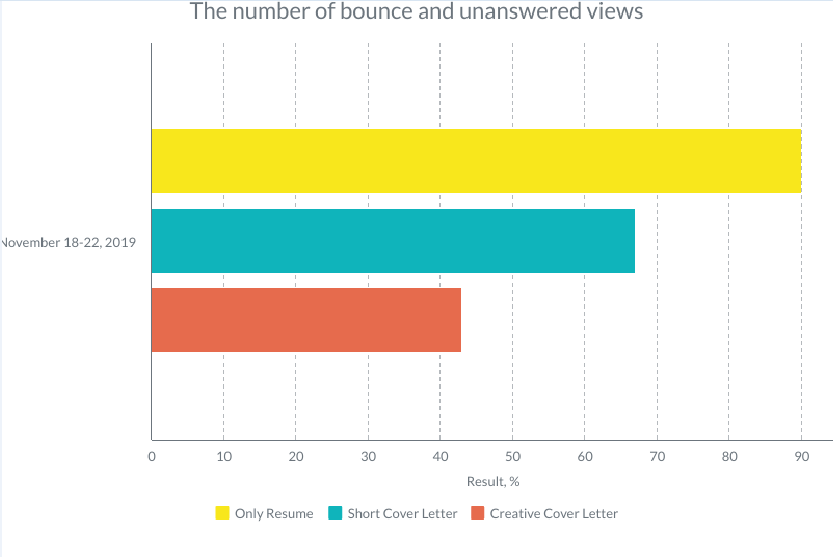
Conclusions: HR managers respond much more (and better) to resumes with cover letters, preferring the text’s constructiveness and the letter’s design to other more emotional, concise comments.
Of course, this study is only intended to guide our readers to logical thoughts. In another sample – the specifics of a particular vacancy – the preferences of employers may become an error for such calculations.
P.S. During the experiment, no manager was injured. 😉
What is a cover letter, and why do you need it?
Having a cover letter is the exception, rather than the rule, but a purposefully-composed letter is generally regarded as a blooming fern.
Despite the fact that a cover letter is not an obligatory element in the recruitment and employment procedure, it would be foolish not to use this tool as an additional means to attract attention and the opportunity to express yourself!
In the USA, 100% of applicants attach a letter of support to the resume – not just five lines, but a beautifully designed letter, with 2-3 paragraphs of text.
This is quite interesting, because when you look at other sectors in the world, such as Europe, you may find that a similar indicator is only 50%, and yet absolutely all recruiters will open and read a cover letter, if there are any. The reasons for this can vary; for example, if there are a lot of candidates, a cover letter can help to determine the choice of whom to interview, or potentially explain any gaps and inaccuracies in the resume itself.
We’ll display the best HR management advice for hiring, taken from the sources of “Harvard Business Review” and “The Guardian” on the infographic:
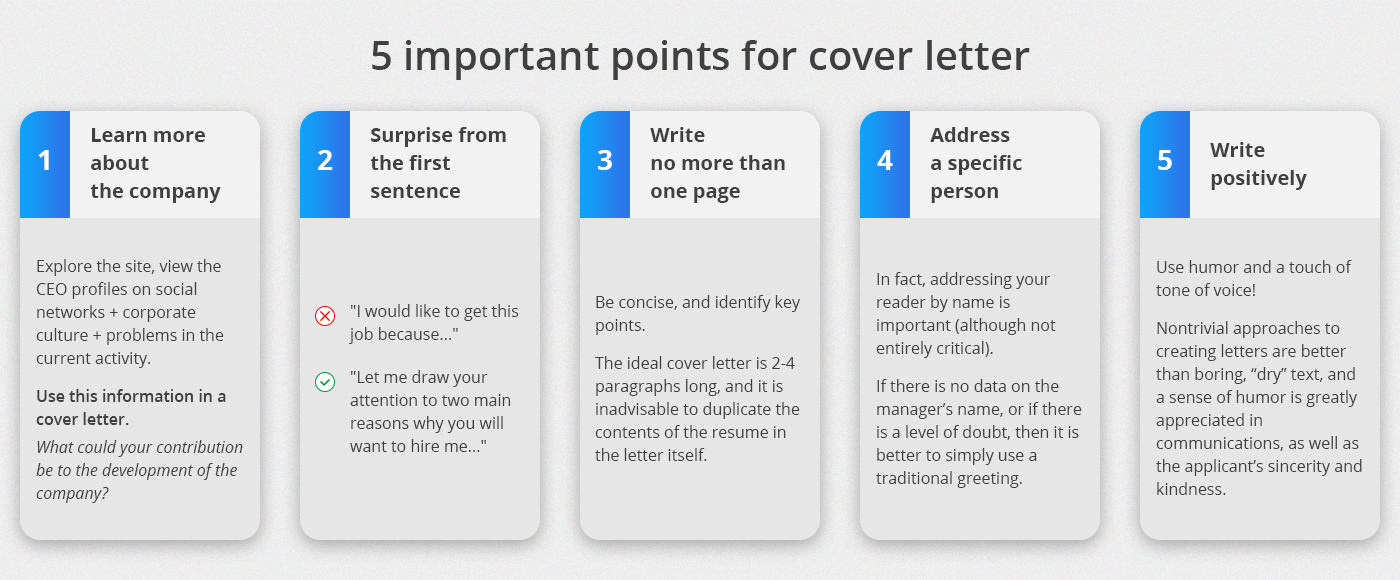
What does the letter’s text consist of?
The ideal size and formatting for a cover letter is 2-4 paragraphs. Its text should include the appeal, the essence of the letter, and the logical conclusion, if desired: a call to action for the employer. Ideally, if you have the opportunity, you’ll specify the HR manager by name. In the USA, it’s easier to address the letter “To whom it may concern” (if you do not know their name, this greeting will be sufficient).
You should probably not duplicate the letter’s text in the summary. Instead, briefly describe your key skills and achievements, communicate the value you can bring to the company, and indicate your compliance and requirements toward this vacancy.
Tip: Remember to edit your letter’s text depending on the requirements in the vacancy! A common mistake is a single letter for all employers. Save your file in PDF format (for design letters), or in Google Docs (for a text document). Do not forget to open access via the link! Send the resume to yourself!
Rules for paperwork
The progressive world has long been using special templates for cover letters and (naturally) resumes. It’s all about perception. Take a look at this perfectionist paradise:

The resume and cover letter are both designed in the same style. Read this article to the end, and you will discover where you can draw up your letter for free!
Tip: Show the letter to your friends/acquaintances before sending. Perhaps some fresh eyes will reveal “flaws” or inaccuracies. You can also add bulleted lists, items and achievements in the form of infographics – which are perceived better than three solid pages of text.
See also: Resume Tips: How To Make a Good Resume
Cover letter when changing the scope of activity
When you’re changing your field of activity, a cover letter is a necessary element. Like if you’ve decided to leave copywriting and go into Internet marketing, for example. The consultant will see your lack of relevant experience, and send your resume straight to the backlog. Having a cover letter with arguments in your favor, however, will greatly increase your chances of success! It is necessary to indicate your reasons for this transition to a new sphere, your capabilities and talents, and your desire to develop and conquer new heights.
Cover letter after a long break
If you are a mother with children, or have been out of the worksphere for awhile, it is obvious that younger, more energetic applicants are more likely to get the job you’re applying for. Be sure to write about your marital status in a cover letter! Also communicate that you have x years of work in the y sphere, and developed your skills even on maternity leave; worked remotely with companies g and r, attended seminars and training, read specialized literature, etc.
The cherry on top will be the mention that you work in multitasking mode, can easily switch from one function to another, know how to organize the work of the messiest employees, and convince even the most capricious customers!
Cover letter for age applicants
If the applicant has reached a certain age, it can become more difficult for them to find a job. Despite the fact that, in any country in the world, it is unlawful to refuse people jobs, upon seeing their age to be 40+, many companies will immediately send such resumes to the basket, or otherwise indicate age restrictions in their vacancy description. But take a look at this cover letter:
“Good day! My name is Eugene. I am 43 years old, but do not rush to close my letter. Your vacancy states that you need an experienced and determined manager who is not afraid of responsibility. And I am like that. For 23 years of professional experience, I “grew up” from a simple bank employee to the head of the regional branch of a large bank. I had to manage small teams of 5-7 people and departments of up to 50 employees. In my work, I use modern management methods, listen to the views of employees, and find a balance between the needs of management and staff. I had to leave my previous place of work because the company was liquidated.
They say that, after 40, it’s impossible to find work. But I believe that someone who does not go looking does not find anything, and has nothing to offer the market. I have recommendations, experience, confidence and opportunities. I want, I can, and I know how to solve the tasks described in the vacancy. I guarantee full commitment and interest in the success of the company.
Thanks for your attention. Always in touch!”
As you can see, such a candidate has every chance of success, because they have declared their competitive advantages in an impactful cover letter!
Cover letter without work experience
Candidates without work experience should rely upon their energy, prospects, lack of family obligations, and willingness to devote themselves to work for acquiring the necessary skills. The decision-making factors in favor of such a candidate are completed higher education, additional courses, and knowledge of foreign languages. For example:
“Hello! My name is Eric. I am 22 years old, I am a graduate of the International University, and have a Bachelor’s Degree in Enterprise Economics.
In the process of studying, I took an active part in student life: I was the head of the group, organized campaigns, and kept reports on finances and the budget of entertainment events.
During practice, I worked as an assistant economist at N. It was an interesting experience, which ultimately convinced me of the right choice of profession. In the course of practice, I conducted financial analysis, learned how to work in 1C, and gained experience in economic planning.
Reasonably approaching the search for work, I agree to the position of assistant or trainee, but with the prospect of career growth. I am energetic and purposeful, and ready to devote myself completely to work.
I would be grateful if you would invite me for an interview. Thank you for your attention.”
Creative cover letters
If you want to stand out amongst your competitors and be remembered by the employer, creative writing is the best way to do it – but only on the condition that you are confident in your ability to write unusual-but-convincing letters. Here is one example of a letter on the verge of foul that the employer will certainly remember:
“Good day! My name is Alexandra, and I am a copywriter. Masterfully, epithetically fertilizes the dry seed of the encyclopedic syllable, cultivating the extraordinary verbal ‘gardens of Babylon.’ I am able to turn boring content into targeted news, create analytical reviews on a given topic, guarantee unobtrusive humor in articles, full return, and plan implementation in a clear time frame. I am all-for freedom of speech and pleasant communication with the team. To the best of my ability to communicate, I can separate friendship from service and endure fairly criticism, but I demand respect for myself. I’m ready to plunge into what others call a routine, but that I perceive as a challenge.
In the attachment, I enclose examples of my work. For the past six months, I have been writing on the topic of travel, have kept a travel blog, and made announcements for a major thematic event.
P.S. If you need a person who will make your work more productive, and save you from problems with illiterate authors and insecure beginners, contact me!)
Oh yes, why do I want to work for you? Because I want my work to “fly away” from a decent launch pad, because you have hundreds of thousands of visitors, and because I can make these figures even higher. Speed: 280 characters / min.
Thanks for your attention!”
Suddenly –
David Schwartz, former head of recruitment at Goldman Sachs; banking headhunter from New York, says, “I will be honest: I never read cover letters. When I get a resume and a cover letter, I always read the resume first and foremost, but I don’t pay attention to the letters.”
There are several conclusions to draw:
So many HRs, so many opinions!
The chances of getting a recruit from Goldman Sachs are minimal, so the question is…
What to write, and what not to write, in a good cover letter?
There have been cases where the applicant, instead of the text in the cover letter, puts a period (or any other sign) in order to quickly move to the next step of the system. This is generally a mistake.
Oftentimes, employers will pose a question in the job description and then ask for an answer in a cover letter. Inattention to this can be a huge error. If there is no answer in the accompanying letter, then this test is not passed.
There is no sadder story in the world than: “I am sure that my experience and professional skills meet your requirements.” It’s like “high quality services”, “many years of experience”, and “best specialists”: all phrases about nothing.
Bad examples include lack of formal boundaries, pathos, tabloid vocabulary, and long biography.
Tip: Do not use facts from your life that are not related to work!
Sample Standard Cover Letter
You know how – and why – to make a good cover letter, and now one thing remains; not a small detail, but the cover letter is not a summary, and its content varies depending on the position.
Accordingly, each cover letter must be customized – that is, to demonstrate your own interest and compliance with the requirements of this particular vacancy. Even if you use a standard sample letter, its content must be edited each time you apply for a new vacancy.
Cover letter for a resume in English
There are several services with cover letter templates which can be readily found on the Internet. Fields with a name and contact details are standardized, with the body of the text containing phrases which can be used for any profession, depending on your skills and the employer’s requirements. One additional, convenient function of such services is to check grammar!
You can use this sample cover letter to create your own copy:
“Dear Andrew,
As a highly skilled project manager with 11 years of experience, I am writing to express my interest in the project manager position at your company.
I have advanced knowledge in developing scopes, keeping projects moving, submitting deliverables on time, and ensuring a seamless experience for all parties involved. Moreover, while my previous position afforded me a well-rounded skillset, including excellent relationship-building and time management skills, I excel at:
- Outlining project scopes, managing timelines, and deadlines (¾ оf all projects within last year met both timeline and budget).
- Tracking and reporting on overall progress (Asana and Jira “godlike” knowledge).
- Managing daily operations and implementation of new programs.
- Forecasting project revenue and ensuring all goals are met (I have a financial background, as a plus).
Please review my attached application for additional details regarding my expertise and achievements. Do not hesitate to reach out, if you have any questions or need further clarification on my experience. I would love to meet with you and discuss this position in detail.
Thank you for your consideration.
Sincerely,
Catherine”
Conclusions
HR managers respond much more frequently, and better, to resumes that have cover letters, often preferring the text’s constructiveness and the letter’s design to more emotional, concise comments.
The ideal cover letter size is 2-4 paragraphs, and the text should include the appeal, the essence of the letter, and its logical conclusion, if desired: a call to action for the employer.
A cover letter is an excellent way to express yourself – and in some cases, such as when you need to highlight or explain something about yourself, it is absolutely irreplaceable!


